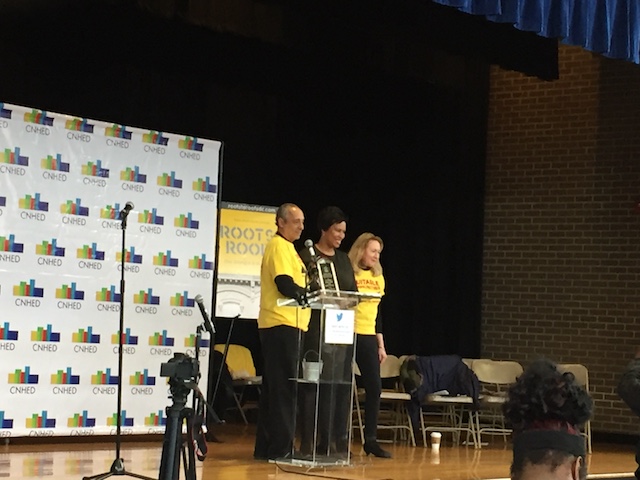Mayor Muriel Bowser, D.C. councilmembers and other community leaders spoke at the Coalition for Non-Profit Housing and Economic Development’s Rally for Racial Equity, Housing and Jobs on March 17. Discussion focused on gentrification and efforts to keep Washington D.C. affordable for all residents, including people experiencing homelessness. However, the mayor and councilmembers disagreed on the extent to which D.C. government has tackled these issues.
At-large Councilmember Robert White emphasized the role that citizens can play in holding the government accountable, in particular as the council decides on the city’s budget for the upcoming fiscal year.
“What accountability looks like is saying ‘yes, D.C. does more financially to build low-income housing than almost any other jurisdiction in the country by investing $100 million a year ,'” said R. White. “But when we look at displacement happening, we know that $100 million is good, but it’s not good enough.”
He added that the money the city has set aside through the Home Purchase Assistance Program to help first-time homeowners buy a home is not enough, as more people have applied for assistance than the city can provide for.
Ward 8 Councilmember Trayon White also emphasized the importance of accountability as the council works on the city’s budget. He said much of the money the city apportioned for the Housing Production Trust Fund does not reach those who need it most.
“We said we were going to put $100 million into affordable housing. We put in $130 million, but most of that money went to [people who make] 80 percent [of the Area Median Income,” White said. “Most of my family doesn’t have $89,000 to spend on housing in Washington D.C.”
Councilmember T. White’s criticism is consistent with the recently released audit of the Housing Production Trust Fund, which contains data indicating that 60 percent of “affordable” units supported by the fund are designated for renters with yearly incomes between $56,000 and $88,000.Bowser, who is running for reelection in November, presented a more optimistic vision of the progress the city has made on affordability, especially through contributions to the Housing Production Trust Fund.
“So what has $100 million meant each and every year for the last three years? It’s meant that we’ve been able to create 5,000 units of affordable housing,” she said. “We will be able to double that, and in the next five years we will be able to create 10,000 more units of affordable housing.”
Bowser also recognized the efforts of her Housing Preservation Strike Force and its recommendation that the city complete the regulations to enforce the District Opportunity to Purchase Act, which allows the city to step in and purchase residential properties to preserve affordable housing.
“We have 8,000 units that could lose their affordability covenants in our city,” Bowser said. “Getting DOPA complete and funded will allow us to step in that gap and preserve those units for D.C. residents.”
She also highlighted the accelerated closure of D.C. General as a step forward towards ending homelessness in the city. “That shelter is an embarrassment to our city,” she said. “We can and we must do better for our most vulnerable children and families.”








